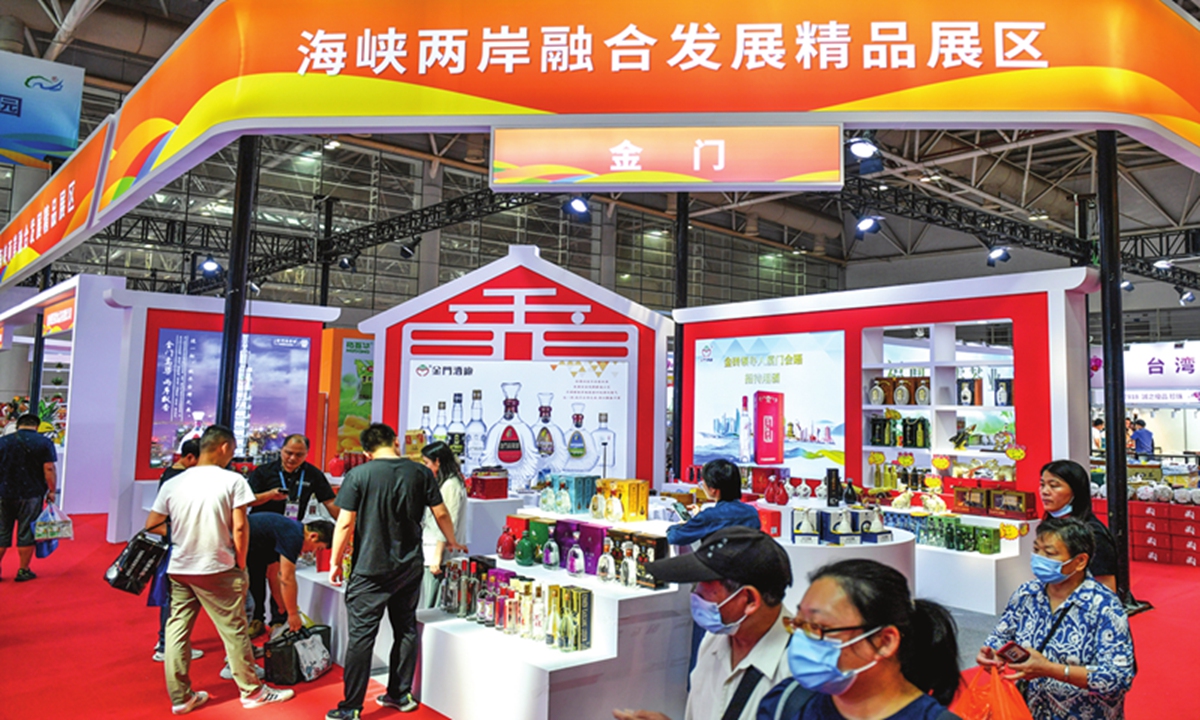
Visitors browse products showcased by Taiwan compatriots at the Sixth 21st Century Maritime Silk Road Exposition and the 25th Cross-Straits Fair for Economy and Trade in Fuzhou, East China's Fujian Province on May 22, 2023. Photo: VCG
China has made solemn representations to the US over its move on a so-called agreement on the first part of the "21st Century Trade Initiative" with Taiwan island, Chinese Foreign Ministry spokesperson Mao Ning said during a Thursday press briefing.
"The US should not send wrong signals to separatist forces seeking 'Taiwan independence' in the name of economy and trade. Taiwan's Democratic Progressive Party (DPP) authorities' attempt to solicit US support for 'Taiwan independence' in the name of economic and trade cooperation is just futile," Mao said.
Chinese experts said that the move showed the US is determined to use Taiwan island as a pawn in its multi-faceted containment strategy against China.
Mao said that China strongly opposes official interaction of any form between China's Taiwan region and countries that have diplomatic relations with China. That includes negotiating or signing any agreement of sovereign implication or official nature.
The first part of the so-called "21st Century" trade initiative between the US and Taiwan island was signed on Thursday.
Wang Jianmin, a senior cross-Straits expert at Minnan Normal University in East China's Fujian Province, told the Global Times on Thursday that the deal would not bring any significant benefit to Taiwan companies, while the uncertainty caused by the deal over economic and trade relations with the Chinese mainland could potentially sacrifice Taiwan island's interests.
"The deal is an unequal political deal under the guise of trade and economic cooperation, and its actual effects will disappoint the high hopes DPP authorities had," Wang said. "There were no concessions over wider market access and tariffs."
He Weiwen, a senior fellow at the Center for China and Globalization, told the Global Times on Thursday that the deal is another case of the "America First" policy and tilted to benefit the US at the expense of the interests of companies and people in Taiwan.
The deal sacrifices the island's semiconductor industry, as it would be bound to invest in the US and compromise its commercial secrets while not getting many subsidies, He said, noting the trap nature of the deal.
On Wednesday, Zhu Fenglian, spokesperson for the Taiwan Affairs Office under the State Council, said that by playing the "Taiwan card" and trying to turn Taiwan into a "porcupine," the US is in essence "destroying" and "damaging" the island, as it is by no means serving the interests of Taiwan compatriots by treating them as "cannon fodder."
In the meantime, Zhu said, as the mainland accelerates the construction of a new development pattern and promotes high-quality development, there are more opportunities, more space and better prospects for Taiwan compatriots and enterprises to develop in the mainland.
On May 23, China's Ministry of Commerce (MOFCOM) strongly criticized the US for engaging in the deal, saying China strongly opposes negotiating or signing any agreement that implies sovereignty and has an official nature.
In April, the MOFCOM launched
a trade barriers investigation into the Taiwan region's trade restrictions imposed on 2,455 imports from the Chinese mainland, after reviewing a request made by three industry associations.
According to customs data, cross-Straits trade decreased by 26.5 percent year-on-year in the first quarter of this year.
Experts also harshly criticized the notion of Taiwan island being under the mainland's economic coercion, noting that the US is the real coercer that politicizes and weaponizes economic and trade relations.




